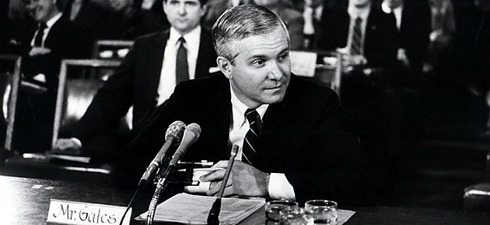
Sonny Vandevelde
Fashion should be fun and with my photography I love to create those fun moments.
Current Affairs
Better than a Robert Ludlum novel
Obama, Ask the Kremlin about Gates
Tuesday 25 November 2008 by: Robert Parry, Consortium News

Robert Gates
during a confirmation hearing for his nomination to be CIA director in
1987. (Photo: Paul Hosefros / The New York Times)
Nearly 16 years ago, during the last transition from a President
Bush to a Democrat, Moscow made an extraordinary gesture to Washington:
The Kremlin supplied a summary of its intelligence information about
secret U.S.-Iranian contacts in the 1980s.
The report was from a national security committee of the Russian Duma to Rep. Lee Hamilton, who had requested what might be in Moscow's files as part of a task force investigation into whether the Reagan-Bush campaign in 1980 had interfered with President Jimmy Carter's bid to free 52 American hostages then held in Iran.
Also see:
The Danger of Keeping Robert Gates
The Russian report arrived late, via the U.S. Embassy in Moscow, showing up on Jan. 11, 1993, but the contents were stunning. The Russians reported that their intelligence revealed that long-rumored meetings between Republicans and Iranians in Europe during Campaign 1980 had indeed occurred.
But this information went against what Hamilton and other members of the task force had decided to conclude, that there had been no such contacts. Hamilton had already rebuffed advice from his chief counsel, Lawrence Barcella, that the investigation be extended a few months because of other late-arriving evidence of Republican guilt.
Instead, Hamilton had ordered the probe wrapped up with a conclusion of Republican innocence. The Russian report just represented another complication, especially since the task force's debunking report had already gone to the printers and was set for release two days later, on Jan. 13, 1993.
So, the Russian report - like much of the other incriminating evidence - was kept secret, unceremoniously stuck into a cardboard box and filed away in a make-shift Capitol Hill storage room.
Barcella told me later that he envisioned this evidence undergoing the fate of the crated Ark in "Raiders of the Lost Ark," lifted into a vast government warehouse in the closing scene. The Russian report, however, ended up in a less grand place, an abandoned Ladies Room off the Rayburn House Office Building's parking garage, where I discovered it in late 1994.
But the reason I'm mentioning this document now is that one of the Americans implicated by the Russian report was Robert Gates, who in 1980 was a junior CIA official, who had served on Carter's National Security Council staff before returning to the CIA as executive assistant to CIA Director Stansfield Turner.
As translated by the U.S. Embassy, the Russian report stated, "R[obert] Gates, at that time a staffer of the National Security Council in the administration of Jimmy Carter, and former CIA Director George [H.W.] Bush also took part" in a meeting with Iranians in Paris in October 1980.
[For details on the October Surprise case, see Robert Parry's Secrecy & Privilege. For the text of the Russian report, click here. To view the actual U.S. embassy cable that includes the Russian report, click here.
The Clinton Transition
When the Russian report arrived in Washington in early 1993, Gates was George H.W. Bush's last CIA director, on his way out with the arrival of Bill Clinton's team. Then, after years as president of Texas A&M, Gates reemerged onto the national stage when President George W. Bush named him Defense Secretary in late 2006.
Now, according to press reports, President-elect Barack Obama intends to keep Gates on as a gesture of bipartisanship and continuity.
Before that happens, however, Obama might want to finish the investigation that Lee Hamilton swept under the rug 16 years ago, at least ask the Kremlin what exactly its evidence is about Gates's role in the Republican-Iranian contacts in 1980, the controversy known as the "October Surprise" case.
Gates has denied any role in the secret Republican-Iranian talks, and it is possible that the Russian intelligence isn't any good. But with the Kremlin now signaling that it hopes for improved relations with the incoming Obama administration, Russian authorities might be willing to share whatever evidence they have.
Over the years, I have tried to get a fuller explanation of the Russian report without much success.
Indirectly, well-informed Russians assured me that the report to Hamilton was based on their own intelligence data and that the information was considered reliable, not simply picked up from press articles. These Russians also expressed shock at how their extraordinary sharing of intelligence information with a longtime enemy was so cavalierly disregarded in 1993.
However, my direct appeals to the Russian report's authors were rebuffed. So it's impossible for me to know how well-founded the Gates allegation is.
What is clear is that after Ronald Reagan took office and sent his campaign chief William Casey over to run the CIA in 1981, Gates's career took off. Casey, who also was implicated in the October Surprise controversy, elevated Gates to be the assistant director for intelligence analysis and then to be deputy CIA director.
Later, Gates was linked to both the Iran-Contra scandal, which involved the trading of arms for hostages with Iran, and the Iraqgate controversy, the clandestine military support given to Iraq's Saddam Hussein during his eight-year war with Iran.
The Iran-Contra connection cost Gates his first shot to become CIA director in 1987, but President George H.W. Bush gave him another chance in 1991. Gates was helped by friends on the Democratic side of the aisle, most notably Sen. David Boren, Senate Intelligence Committee chairman, and Boren's chief of staff, George Tenet.
In 1992-93, CIA Director Gates got another helping hand from Lee Hamilton regarding the October Surprise scandal, which Hamilton swept under a very lumpy rug. The Russian report was just the last of the bumps.
During Campaign 2008, Gates got lucky again when Boren and Hamilton emerged as senior foreign policy advisers to Obama. They are now reportedly part of the transition contingent urging the President-elect to retain their old friend as Pentagon chief.
According to news reports, Gates's reappointment is expected after Thanksgiving. Before then, however, the Obama foreign policy transition team might want to ask what information exists in Moscow's intelligence files.
-------
Robert Parry broke many of the Iran-Contra stories in the 1980s for the Associated Press and Newsweek. His latest book, Neck Deep: The Disastrous Presidency of George W. Bush, was written with two of his sons, Sam and Nat, and can be ordered at neckdeepbook.com. His two previous books, Secrecy & Privilege: The Rise of the Bush Dynasty from Watergate to Iraq and Lost History: Contras, Cocaine, the Press & 'Project Truth' are also available there. Or go to Amazon.com.